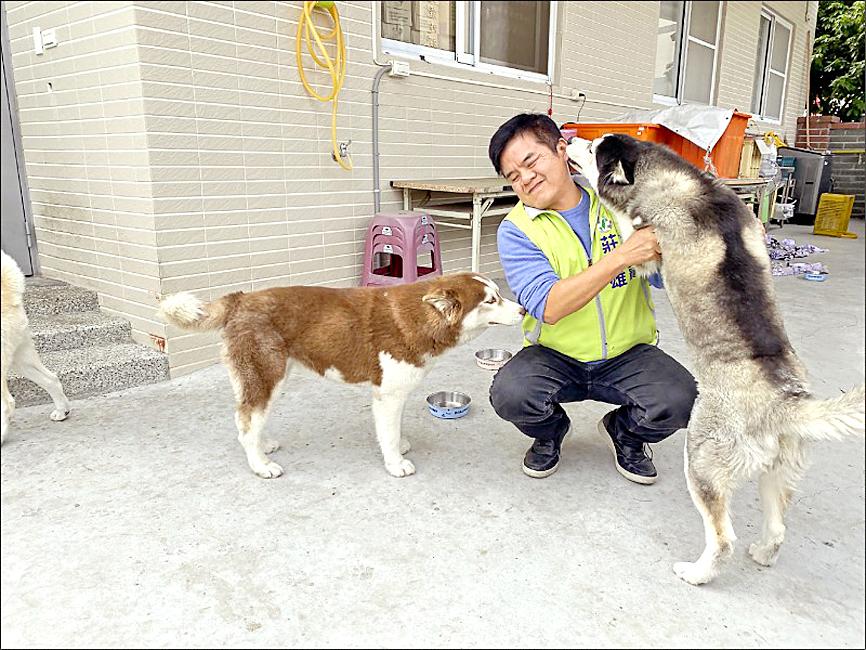The Legislative Yuan is likely to consider three constitutional amendments to enshrine animal rights in the Constitution, a move that has found support from lawmakers across party lines, legislators have said.
Separate draft versions of the amendments have been introduced for this legislative session by Chinese Nationalist Party (KMT) Legislator Cheng Li-wun (鄭麗文) and Taiwan People’s Party Legislator Tsai Pi-ru (蔡壁如).
Other lawmakers who expressed support for the proposals include Democratic Progressive Party (DPP) legislators Chen Ting-fei (陳亭妃) and Tsai Shih-ying (蔡適應), KMT Legislator Lin Yi-hua (林奕華) and New Power Party Legislator Chen Jiau-hua (陳椒華).

Photo courtesy of Chuang Jui-hsiung
Cheng’s version proposes that “the government shall protect biodiversity, prioritize the protection of animals and their habitats,” and “the nation shall prepare an animal protection vision, rule of law and prioritize animal welfare.”
Her proposal says that private citizens or civic groups should have the right to litigate the government, private enterprises or other citizens for causing unjustified environmental harm.
Cheng said existing animal welfare protections furnished by the Animal Protection Act (動物保護法) of 1998 can be superseded when competing claims are made against it from constitutionally protected rights to academic freedom and property rights.
Enshrining animal rights in the Constitution could provide a fairer basis for judges to arbitrate cases in which animal rights conflict with property or another constitutional right, she said, adding that the proposed amendment would also serve a declarative and didactic purpose.
Tsai Pi-ru’s proposal seeks to add an article to the Constitution stating that “animals are not objects; they possess sentience and they are entitled to dignity. This objective value shall be protected explicitly by law.”
She said the transition from animal welfare to animal dignity is a “step forward in human ethics,” and that there is a constitutional movement for the incorporation of animal rights worldwide, including in Austria, Brazil Egypt, Germany, India, Luxembourg and Switzerland.
In addition to better protecting animal rights, the amendments would facilitate efforts to adjust damages and liabilities in legal cases stemming from harm to animals, she said.
DPP Legislator Hung Sun-han (洪申翰) said that enshrining the protection of animals in the Constitution is supported by lawmakers from multiple parties, adding that the issue “is important for Taiwan’s progress as a civic society.”
DPP Legislator Rosalia Wu (吳思瑤), who is known in the legislature for keeping an office cat and several more at home, said she is not opposed to the amendments, but views the implementation of existing policies as a greater problem.
The government has not solved overcrowding in the nation’s animal shelters or a shortage of pet adopters, despite the implementation of no-kill shelters, she said.
Another animal lover, DPP Legislator Chuang Jui-hsiung (莊瑞雄), urged caution.
“Proponents need to clarify if they want an animal rights amendment or animal protection amendment,” he said.
“If it is animal protection, that could be beneficial in giving more legitimacy to the making of animal protection policies or laws. However, if they are talking about animal rights, then we will be called upon to draw the bonds between the rights of different animals and even between the rights between animals and plants. They need to be more prudent about this,” Chuang said.

SECURITY: As China is ‘reshaping’ Hong Kong’s population, Taiwan must raise the eligibility threshold for applications from Hong Kongers, Chiu Chui-cheng said When Hong Kong and Macau citizens apply for residency in Taiwan, it would be under a new category that includes a “national security observation period,” Mainland Affairs Council (MAC) Minister Chiu Chui-cheng (邱垂正) said yesterday. President William Lai (賴清德) on March 13 announced 17 strategies to counter China’s aggression toward Taiwan, including incorporating national security considerations into the review process for residency applications from Hong Kong and Macau citizens. The situation in Hong Kong is constantly changing, Chiu said to media yesterday on the sidelines of the Taipei Technology Run hosted by the Taipei Neihu Technology Park Development Association. With

CARROT AND STICK: While unrelenting in its military threats, China attracted nearly 40,000 Taiwanese to over 400 business events last year Nearly 40,000 Taiwanese last year joined industry events in China, such as conferences and trade fairs, supported by the Chinese government, a study showed yesterday, as Beijing ramps up a charm offensive toward Taipei alongside military pressure. China has long taken a carrot-and-stick approach to Taiwan, threatening it with the prospect of military action while reaching out to those it believes are amenable to Beijing’s point of view. Taiwanese security officials are wary of what they see as Beijing’s influence campaigns to sway public opinion after Taipei and Beijing gradually resumed travel links halted by the COVID-19 pandemic, but the scale of

A US Marine Corps regiment equipped with Naval Strike Missiles (NSM) is set to participate in the upcoming Balikatan 25 exercise in the Luzon Strait, marking the system’s first-ever deployment in the Philippines. US and Philippine officials have separately confirmed that the Navy Marine Expeditionary Ship Interdiction System (NMESIS) — the mobile launch platform for the Naval Strike Missile — would take part in the joint exercise. The missiles are being deployed to “a strategic first island chain chokepoint” in the waters between Taiwan proper and the Philippines, US-based Naval News reported. “The Luzon Strait and Bashi Channel represent a critical access

Pope Francis is be laid to rest on Saturday after lying in state for three days in St Peter’s Basilica, where the faithful are expected to flock to pay their respects to history’s first Latin American pontiff. The cardinals met yesterday in the Vatican’s synod hall to chart the next steps before a conclave begins to choose Francis’ successor, as condolences poured in from around the world. According to current norms, the conclave must begin between May 5 and 10. The cardinals set the funeral for Saturday at 10am in St Peter’s Square, to be celebrated by the dean of the College